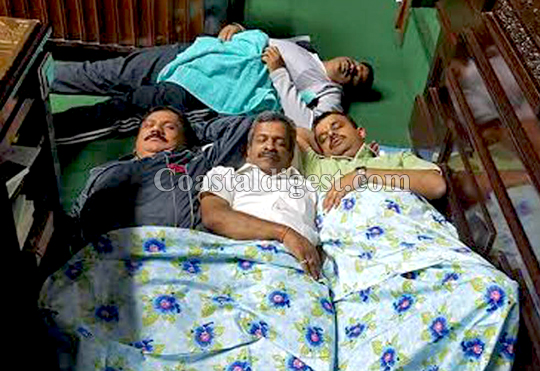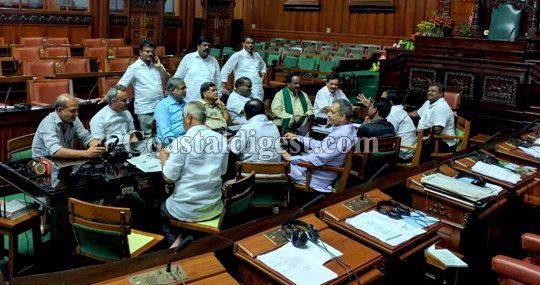Bengaluru, Jul 14: Watching television, catching up with old times, singing bhajans and songs and having their dinner together were the activities of the legislators of the Opposition parties - the BJP and the JD(S) - till late in the night on Wednesday.

They began their day-night dharna in both the Houses of the legislature seeking resignation of Bengaluru Development Minister K?J?George on DySP Ganapathi suicide case.?
Secretariats of the Assembly and Council had made arrangements for the night stay of the members by providing bed sheets, blankets and pillows besides dinner. The MLCs were asked to have dinner at a room adjoining the Council hall, while it was served in the lobby for the MLAs. In the Assembly, vegetarian food including chapati, rice dishes and gravy were served.
The secretariat also deputed medical staff, aside from ensuring medicine and ambulance services. Jammers in both the Houses were switched off to facilitate phone calls by members. Media was not allowed into the lobby. Both the parties allowed their women legislators to go home.
As the members were given access to cable TV in the lounges of both the Houses, they spent their time watching panel discussions and news updates on TV channels. The BJP members sat together and sang bhajans for some time.
“After a long time, all of us are getting to spend some time together. We have been sitting and talking about both the current developments and the old times,” said JD(S) MLA G T Devegowda. A?majority of the legislators went home to change or get their night clothes and returned.
The last time that the Opposition staged an all-night protest was when they demanded the government to order a CBI probe into the death of IAS officer D K Ravi. The BJP and the JD(S) members had stayed in the Assembly for one whole night on March 17, 2015 seeking a CBI probe.
In November 2013, B S Yeddyurappa, who was then the KJP president had staged an all-night dharna for two nights demanding an extension of Shaadi Baghya' scheme to all communities. The session was then held in Belagavi. Prior to that, the Opposition parties had staged a night dharna on July 12, 2010 over the illegal mining issue.
However, JD(S) leader H?D?Kumaraswamy did not take part in the overnight dharna as he left for Mysuru to resume his son's film shooting.
Session may end on Friday
There was speculation in political circles on Wednesday that if the Opposition continues with its day-night dharna until Friday, then the government may get the budget proposals and bills passed amid the din and adjourn both the Houses sine die. The budget proposals have to be passed before July 31 as the legislature had only given its approval for a four-month vote-on-account in March.






Comments
Is their Father's money they spending for all this.
Useless -Fit for only eating & sleeping and creating chaos in assembly.
There should be some limit for agitation. Once the house is closed for the day these so called MLA's should go out from the house.
Staying overnight in the respected house is goondaism. There is no decency in their act. Government is paying tax payers money to these goons. These people should be arrested and sent to street. Providing food , bed and blanket.. is it their Maavana Mane.
Where were these opposition legislators when other police men suicide?
There is a limit for drama.
GOOD CHANCE TO SERVE THEM BEEF ....LET THEM TASTE
Add new comment